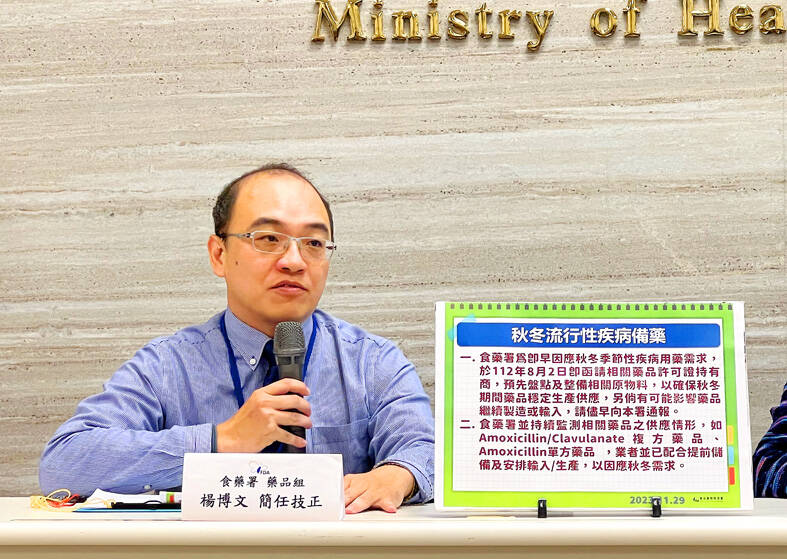Taiwan has enough of the drugs used to treat Mycoplasma pneumoniae, as it increased imports of a brand-name drug last month and expanded domestic production of generic drugs, the Food and Drug Administration (FDA) said yesterday.
As some parts of China are seeing a spike in respiratory illnesses, reportedly caused by multiple pathogens, including the M. pneumoniae bacteria, many Taiwanese media outlets have reported public concerns about children catching M. pneumoniae.
M. pneumoniae is a common bacterial respiratory tract pathogen that causes infections the whole year round in Taiwan, Centers for Disease Control (CDC) Deputy Director-General Philip Lo (羅一鈞) said on Tuesday evening, adding that it mainly spreads from person to person through respiratory droplets.

Photo: CNA
A 2011-2012 survey by the Taiwan Pediatric Infectious Diseases Alliance found that M. pneumoniae was the second-most common pathogen that caused community-acquired pneumonia in children, he said, adding that M. pneumoniae infections are most common in children aged five or older.
The epidemiology of M. pneumoniae has not changed much in 10 years, and most infections are mild, usually resolve on their own and rarely require hospitalization, Lo said.
While historical trends show that M. pneumoniae infections tend to peak every three to seven years, there has not been a significant rise in cases so far this year, he said.
One antibiotic used to treat M. pneumoniae infections in children is azithromycin powder for oral suspension, FDA Deputy Director Cheng Hwei-fang (陳惠芳) said yesterday.
The drug is used to treat bacterial infections of the respiratory tract, skin and soft tissue, as well as otitis media and sexually transmitted diseases, she said, adding that there are two valid drug permits in Taiwan.
An average of 4,680 bottles of azithromycin were used each month last year, but the average monthly usage increased to 8,050 bottles this year, so although 1.3 times more of the drug was imported, supply did not meet demand, she said,
The situation was reported in August, and a large amount of the drug was imported last month, Cheng said, adding that there are about 27,000 bottles in stock, and domestic production of a generic version of the drug has been increased by two to three times.
There are seven valid drug permits in Taiwan for azithromycin oral tablets for adults, and while the average usage is approximately 200,000 tablets per month, there are about 1.3 million tablets in stock — enough to last five to six months — and there are plans to import or manufacture about 2 million tablets next month, so there should be no shortage, she said.
FDA Medicinal Product Division head Yang Bo-wen (楊博文) said in preparation for a likely increase in infections due to Taiwan lifting its COVID-19 restrictions earlier this year and because many respiratory infectious diseases peak in autumn and winter, the FDA on Aug. 2 told drugmakers with permits for antibiotics, drugs for treating respiratory illnesses and gastrointestinal tract infections, antipyretics, and analgesics to ensure a stable supply of the products.

Travel agencies in Taiwan are working to secure alternative flights for travelers bound for New Zealand for the Lunar New Year holiday, as Air New Zealand workers are set to strike next week. The airline said that it has confirmed that the planned industrial action by its international wide-body cabin crew would go ahead on Thursday and Friday next week. While the Auckland-based carrier pledged to take reasonable measures to mitigate the impact of the workers’ strike, an Air New Zealand flight arriving at Taipei from Auckland on Thursday and another flight departing from Taipei for Auckland on Saturday would have to

The manufacture of the remaining 28 M1A2T Abrams tanks Taiwan purchased from the US has recently been completed, and they are expected to be delivered within the next one to two months, a source said yesterday. The Ministry of National Defense is arranging cargo ships to transport the tanks to Taiwan as soon as possible, said the source, who is familiar with the matter. The estimated arrival time ranges from late this month to early next month, the source said. The 28 Abrams tanks make up the third and final batch of a total of 108 tanks, valued at about NT$40.5 billion

A group from the Taiwanese Designers in Australia association yesterday represented Taiwan at the Midsumma Pride March in Melbourne. The march, held in the St. Kilda suburb, is the city’s largest LGBTQIA+ parade and the flagship event of the annual Midsumma Festival. It attracted more than 45,000 spectators who supported the 400 groups and 10,000 marchers that participated this year, the association said. Taiwanese Designers said they organized a team to march for Taiwan this year, joining politicians, government agencies, professionals and community organizations in showing support for LGBTQIA+ people and diverse communities. As the first country in Asia to legalize same-sex

MOTIVES QUESTIONED The PLA considers Xi’s policies toward Taiwan to be driven by personal considerations rather than military assessment, the Epoch Times reports Chinese President Xi Jinping’s (習近平) latest purge of the Chinese People’s Liberation Army (PLA) leadership might have been prompted by the military’s opposition to plans of invading Taiwan, the Epoch Times said. The Chinese military opposes waging war against Taiwan by a large consensus, putting it at odds with Xi’s vision, the Falun Gong-affiliated daily said in a report on Thursday, citing anonymous sources with insight into the PLA’s inner workings. The opposition is not the opinion of a few generals, but a widely shared view among the PLA cadre, the Epoch Times cited them as saying. “Chinese forces know full well that